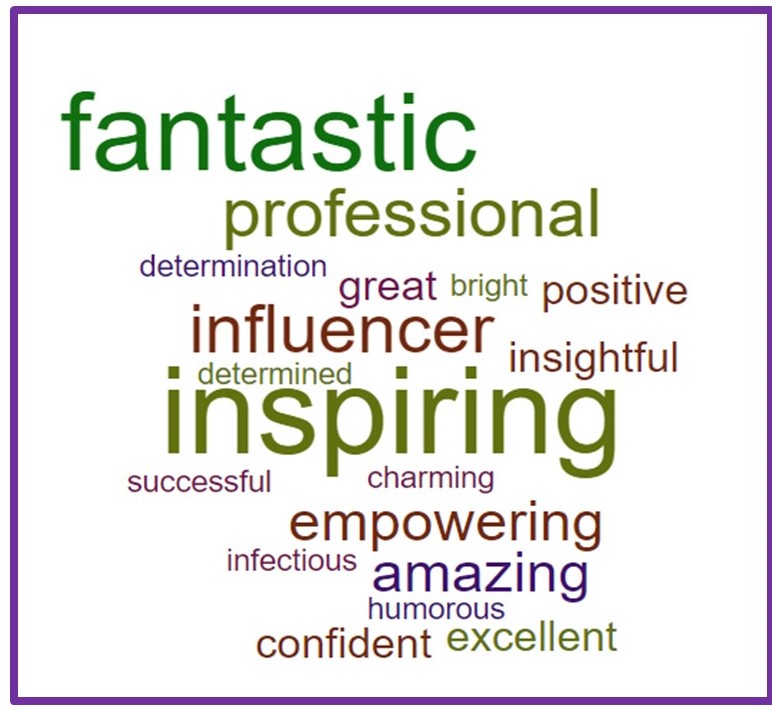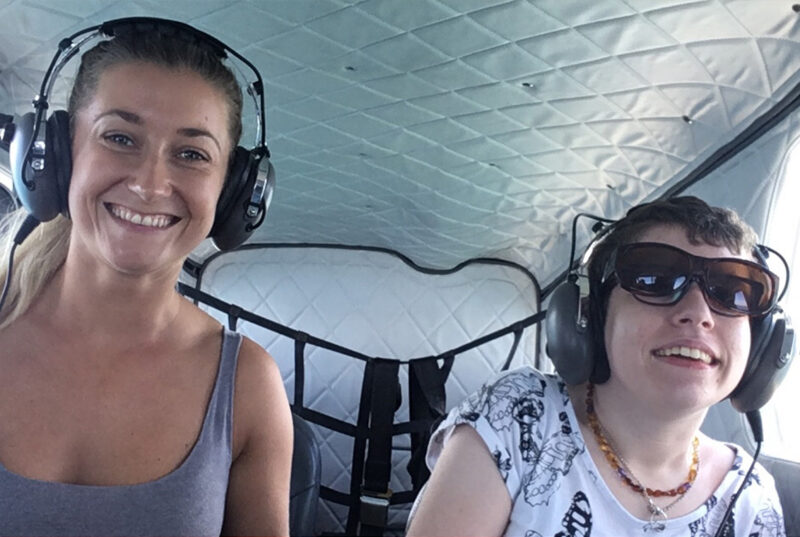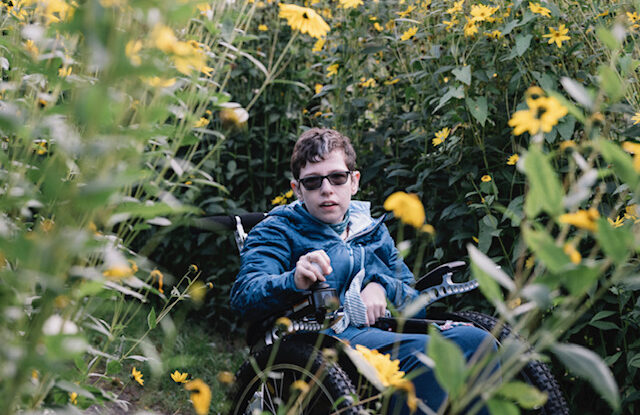 The original aim for my website was to share my lived experiences using AAC, and my passion for this remains. Here you will find my focus is living with cerebral palsy, dysarthria, and hearing impairment all of which impact my life daily.
The original aim for my website was to share my lived experiences using AAC, and my passion for this remains. Here you will find my focus is living with cerebral palsy, dysarthria, and hearing impairment all of which impact my life daily.
Communication
This section focuses firstly on my experiences and strategies relating to being an augmentative and alternative communication (AAC) user since the age of 4. Secondly, the impact of my hearing impairment on both my communication and day-to-day life. Then the crucial importance of having good communication partners in all areas of life, both when you use AAC and are deaf. All three topics are interlinked and have direct consequences for my well-being, learning and leading my own team of personal assistants. The ability to communicate is a human right, and with the right support, those with communication impairments have a greater opportunity of being included and empowered in society.
Well-being
Being fit for purpose as an individual is important for everyone. I’ve broken this into 2 sections, again drawing on my own experiences. First is physical well-being, where I share about living with CP, the importance of being active, managing pain, nutrition, energy and much more. Secondly, from a mental and emotional well-being perspective, my journey has been full of highs and lows. Here I draw on the positive strategies that help me daily to remain resilient and ready to take on the challenge of life. These strategies include the importance of dreaming as well as mindfulness and relaxation techniques. I also focus on the value of talking with others to make sense of the world around us.
Life skills
Having the skills for life is a huge area. I’ve broken this into stories relating to lifelong learning. leadership and living independently. This begins with my experiences of attending mainstream and special schools and then moving to university. I’ve lived independently now for over a decade, which means I’ve had to develop leadership skills to manage my team daily. I want to share practical tips and some of the challenges of managing this. Finally, and in hindsight, what I really should have known when I started.
About Beth
Education
I graduated from the University of York, with first-class honours, in Social Policy in January 2021. Overall l had a really enjoyable experience but it was not without some stress. Full-time study created considerable fatigue because of my CP. This led me to extend the course over nearly 8 years to ensure I had time to do justice to the work. What I loved was how I was included and empowered, the opportunity to understand and unpick policy. Then to undertake research, and ground my thoughts in evidence. The result is this has made me a reflective and critical thinker about life in general.
During my time in elite sport, I was able to also consider what I wanted to do with the rest of my life. My passion for AAC and empowering others had never waned. I knew now from my undergraduate studies that to achieve what needs to happen for those with complex communication impairments I wanted to focus on policy and understanding policy implementation. The result is I returned to the University of York in September 2022 to undertake full-time a research masters in Social Policy which I should complete in 2025 (extra time due to my disability).
Advocacy, public speaker and trainer
I’ve been presenting at conferences and workshops using augmentative and alternative communication AAC since I was 12, both in the UK and internationally. My first presentation was a little scary but I loved that people had chosen to come and listen to me. They then stayed to ask questions and even sought me out across the conference to find out more about me. This positive experience has meant I have become a confident public speaker and AAC workshop leader. To date I’ve written and delivered dozens of sessions on diverse topics. This has ranged from learning styles, developing language and literacy, sport, leadership and independent living.

More recently I’ve also developed and delivered training for my own team and independent organizations specifically around the needs of AAC users.
These days, I am asked to take part in many different campaigns and activities. Since each of us can only focus on a few things well, I have chosen to prioritise advocating for others who use AAC.
Augmentative and Alternative Communication AAC
I use augmentative and alternative communication (AAC) because only a few people understand my speech well. As a multi-modal communicator I use a powered (electronic) communication aid every day. This is supplemented by eye pointing, facial expression, finger/hand gestures, body language and spelling out words on a letter card. And not forgetting my own difficult to understand verbal speech.
Retired Paralympian
I’ve played boccia since I was 10. In early 2020 I was invited onto the Boccia UK World Class programme as a BC3 athlete. This classification means I used an assistive device (ramp) and had a sports assistant on the court. I was lucky enough to be selected to represent Great Britain in the 2020 Paralympics, which, because of Covid, meant we didn’t get to Tokyo until 2021. You can find out more about my boccia journey in the physical well-being section and on my blog.
Why do I have a website and blog
My website was in direct response to the many queries I began to get after starting to present papers at conferences. It was too challenging when boarding away at school to answer individual emails. The resulting initial website was a way to share experiences relating to augmentative and alternative communication questions and topics.
Over time I added pages and the website took on a life of its own, until we got to what we have today. I continue to be overwhelmed and humbled that people want to share my journey. I hope you enjoy reading and find the content both useful and thought provoking.
Passion for potential
I believe everyone needs the opportunity to explore what they can become, not what they are today. Then, when they realize what that future might be, to develop the tools and resources needed to fulfil that ambition or potential. You could say I have a passion for potential. Because, I’m living my own dream, and learning to fly in life.

In my humble opinion everyone, whatever their ability, should have things they are passionate about. Each of us has the potential to be many things, and a ‘disability’ label should not define us. Just because things may be challenging does not mean we cannot fulfil our own potential and achieve to the best of our ability.
So why passion and potential?
Passion is an emotion, it’s a strong feeling, that enthusiasm or a burning desire to achieve a goal. I have been lucky to date realizing my own dreams. I’ve had a team of people behind me throughout my life, my own personal cheerleaders working alongside me to help me achieve my goals. I do believe nothing is impossible, we just need to find a way, which might not always be the ‘usual route’. This positive support has given me a passion to help others if I can by sharing my own journey.
Potential is the opportunity to develop, to become your future best self. When we think about a child we want to see them thrive in the here and now. But we also want to give them the right building blocks, the skills they will need for what they will become in the future. This is achieved in society through education, gaining new experiences and developing life skills. And, it should be no different for anyone who uses a communication aid. We need to ensure everyone is in a position to achieve the best they can be in their future life.
The future: combining passion, potential and purpose
At 18 I knew I needed a solid foundation to deliver on my dreams. You can read more about this in the mental well-being section. What was important was I knew I wanted to change things for people who use AAC. Dreams will never become anything unless you have an action plan to make them a reality. My choice to study social policy has been enlightening, and thought-provoking and has provided me with a platform for advocacy. The result is that my head is bursting with ideas of how to make my passion for the empowerment and inclusion of AAC users a reality.
Since 2022 I’ve been:
- Invited to be Patron of 1 Voice.
- Elected as a board member of Communication Matters (ISAAC UK).
- Continued to be a committee member of the International Communication Rights Alliance (ICRA).
- An active member of the International Society of Augmentative and Alternative Communication (ISAAC).
In November 2023 I was privileged to become a Shaw Trust Disability Power 100 finalist. This is the list of the top 100 most influential disabled people in the UK where I finished in the top 10 community advocates category.
I’m delighted to announce that on the 2024 Disability Power 100 I was voted by my peers the winner in the Grassroots and Community Advocate Category. This placed me overall #10 most influential disabled person in the UK.
In the summer of 2024, I was awarded an honorary degree of Doctor of Health from Manchester Metropolitan University in recognition of my AAC advocacy work and as a Paralympian. What an absolute privilege to be acknowledged for my passion in life by one of the leading institutions for AAC in the UK.
Please join me as I share here these ideas and thoughts on AAC and life.


If you found this interesting or
helpful please feel free to share.